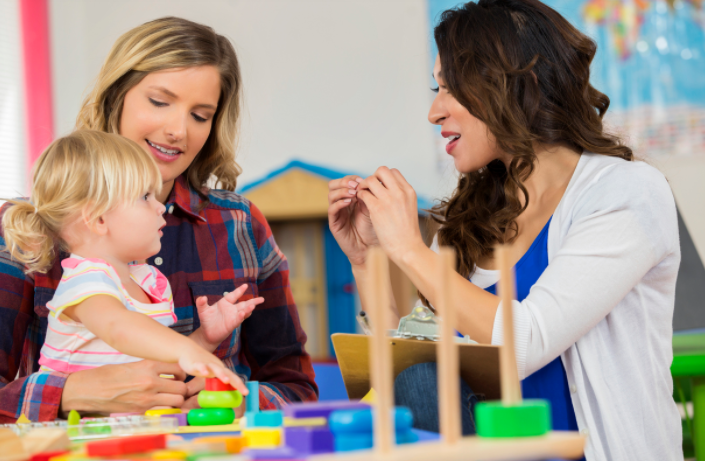When kids are smaller, parents do everything for their children. They clean their rooms, cook them food, do their laundry, and work so they can afford essentials for their child. They do everything for their kids. But their ultimate goal in life is to make their child independent and self-sufficient. They want their child to grow up and do all these tasks themselves. Hence you should teach your children life skills which are also essential for child development.
But most parents are confused about how to teach their children these life skills. You may be confused about when to start teaching them? Or even what you should be teaching? To get rid of this confusion, we have listed 13 life skills you must teach your children. These life skills are something that you can teach progressively over time. It depends on the child’s development stages and their age as well.

So without further ado…
Here Are 13 Simple Life Skills You Must Teach Your Children
Time Management
Most parents understand the importance of time management in managing their work and family life. However, it is also critical that children begin learning time management skills as soon as possible. But how can we start teaching our children the time management skills they need in their life? Well, we have to start slow.
Start by making a schedule for your child. Make them follow a set routine for going to school and at home. Divide their time at home in their schedule for schoolwork, playing, and entertainment. As they grow older, you can practice this life skill by having your child take responsibility for their own time. It will make them more independent and help them learn this essential life skill by taking baby steps.
Instead of waking them up, get them an alarm clock that they can use to wake up on time for school. Get them a planner to help them keep track of their schoolwork and other extracurricular activities, as well as that which to be completed by when.
Interpersonal Skills
Emotional intelligence, along with good interpersonal skills, is highly valued in today’s age. Kids converse with parents but parents have always taught their children not to interact with strangers. They are always concerned about how strangers might take advantage of their children. But interpersonal skills are an essential life skill. When your kids grow up, they have to make friends, find a job, and navigate through life talking to strangers.
They need skills and confidence to talk to other people. Interpersonal skills relate to teaching your child skills like negotiation, persuasion, formal communication, and presentation skills. So start by teaching your proper child etiquette when it comes to communication.
Introduce them to proper ways to communicate by starting with making an order for themselves at the restaurant. Ask them to make requests when they don’t find something at the grocery. As they grow older, make them order for the take-out and so on. It will help children boost their confidence and raise their interpersonal skills.

Decision-making Skill
Decision-making is an important life skill to have. When we are kids, our parents decide everything for us. They decide what is best for us to eat, wear or go. And as we grow up, we learn to decide what is best for ourselves with others’ help.
Similarly, do this with your kids. Start helping them make their own decisions. You can start doing this with simple tasks when they are younger. When your kids are around 3 or 4, offer them the option between two outfits they would like to wear and make them choose. Slowly apply this to the activity after school when they are 5.
When your children are growing up, you can progressively give them more options to choose from. Tell them to consider all the options before making any big decision. The skill of evaluating all the available options is necessary to make the right decisions. Please provide them with a longer time when they have bigger decisions to take and provide deadlines when the matter is smaller.
Basic Budgeting
It is one of the most fundamental of life skills. Give your kids a set amount of pocket money every week to cover their expenses. If they want to buy something more expensive, do not jump in and buy it for them. Ask your children to save some of their pocket money for it. You can also encourage this behavior by adding a certain amount of money to reach their saving goal.
When your kids get older, you can start providing them with an allowance for helping around the house. Tell them to save the allowance to buy their stationery or other necessary items. Teenagers need to learn better money management skills so they can save and spend wisely. Teach them the basics of writing a check or using a credit card and make them realize that using a credit card isn’t free money.
Simple Cooking
Even the smaller children will learn how to cook in the kitchen. Of course, we’re not talking about a five-course meal, but you should teach preschoolers to make a sandwich, and elementary school kids use the microwave. When it’s time to prepare, your kids will be your sous chefs, from toddlers to teenagers. And you can begin with small steps! Teach your child how to make their sandwiches and how to butter bread and prepare a salad.
You may also request their assistance in baking, handing you ingredients while you cook, or keeping the kitchen table clean. As they become teenagers, delegate them bigger chunks of cooking tasks. Delegate the task of boiling the potatoes if you are making mashed potatoes. As they are making the dish, tell them what they need to do next.

Laundry And Folding
Teaching your kids how to do their laundry is not just a life skill that will benefit them but also benefit you. You need to include your kids in household tasks like doing the washing. It would help if you showed them how to use the washing machine, distinguish the types of clothes to wash, how much detergent to use, and how to use the dryer, among other things.
Helping you with laundry will teach your toddler a lot, such as how to organize clothes by color and how to recognize textures. Kids will start placing clothes in the washer and moving them to the dryer as they get older.
Elementary school students will then learn how to use the washer and dryer and how much laundry detergent they need to use. When the laundry comes out of the dryer, show them how to fold and put their clothes away. They’ll soon be able to do all of their laundry.
Cleaning And Other Chores
It’s sometimes easier for parents to do all of the housework themselves. It is indeed a missed opportunity for us to teach our children how to clean the house, which they’ll need to know when they leave for college and finally have their own house to take care of. Begin with age-appropriate chore charts that teach children how to make their beds, empty their dishwashers, and dust.
You can start when they are young. Tell them to keep their toys away after they are done playing. When they grow older, ask them to help you empty the dishes after dinner or put them out of the dishwasher. Make them help you with chores during the weekend by making chore charts. Eventually, designate an entire chore as their responsibility when they start doing it good independently.
Basic Gardening
You could urge them to engage in sustainable initiatives such as gardening and waste disposal. If you have a garden, give them a section of it to plant whatever they want. Make it their duty to water the plants and help them sow seeds. You can still use planting pots if you don’t have a yard.
Teach your kids how to make compost and teach them the value of it. You can also ask them while you are doing yard work. Teach your kids about the basics of plants you have in your yard. Make it a science project to make sprouts and plant them in your yard. Make them check and care for the plants they planted themselves.
Gardening is good exercise and gives outsights in nature. With extra time outdoors you can play sport with kids. Interest in outdoor games since childhood is good for children as such activities keep them healthy and active and eager for sports.
First-aid
You can’t promise to be there every time your child gets injured, bitten, or gets a rash! So, how about arming them so that they can provide for themselves in an emergency before they reach adulthood? It is something that your child’s education can cover, but I highly recommend reinforcing it at home by teaching your child basic first aid techniques. So start them by teaching them how to treat a wound.
Tell your children to sanitize the area and apply the ointment. Teach your kids how to tie a bandage too. It can prove to be essential later in life. Also, teach them advanced first-aid skills as they grow older. They might need to know how to help someone who is choking, how to treat a burn wound, how to treat a snake or bug bite, and many more. Teach them the importance of taking the necessary steps to keep calm in emergencies.
Comparison Shopping
Comparative shopping falls under the category of educating your child about budgeting. Parents can relate to kids nagging them when they are in stores. Such rules irritate teenagers but as they often ask for this and that. So how do you teach them the value of comparative shopping and money management? Tell them why you often prefer less costly choices.
If they choose to purchase a few items when you go shopping, persuade them to choose one or two items of the same kind. This type of budgeting training instills in your child the habit of not wasting money and reinvesting it. Also, show your child how prices differ in different stores online and offline.
Help them make decisions based on the prices of the products and their quality. Teaching children to be wise shoppers and compare prices will allow them to save money everywhere they go while still making sound decisions about their purchase items.

Internet Safety
According to Internet safety and special-needs advocate Joscelyn Ramos Campbell, a mom of four in Clermont, Florida, who blogs at MamiOfMultiples.com, kids spend more time on screens ever before, so it’s necessary to reinforce a few guidelines to help them safely navigate the digital world. Discuss the following best practices with your child as soon as he or she is willing to use technology unsupervised:
- Choose a difficult-to-guess password and keep it secret at all times.
- Only talk to people you meet in real life and don’t offer personal information like your birthday, home address, or phone number.
- Be considerate. Remember that everything you give or tell practically exists in perpetuity.
- Before you download something or press a pop-up, get permission or ask for assistance.
- The most critical aspect let your child know that he or she may come to you with any problem.
Use Of Basic Maintenance Tools
While we teach our kids essential life skills, we forget about teaching kids how to repair and maintain something they own. It would be best if you taught your child how to change the bulb, unscrew something, drill, hammer a nail, use tools, and change tires.
You can start this by asking for assistance when you are doing some repair work. Teach your children the step-by-step process and guide them through what the work entails. The next time you have to change the bulb, ask your kid to do it. You can supervise what to do from the side. You can also teach them the necessary safety required for each repair and maintenance activity.
Navigating Skills
Begin by showing your children the routes around your house, and then put them to the test by asking them to lead you home or to school the next time you drop them off. It would help if you then taught your child how to read a map and how to use a GPS and follow its instructions. Some children have forgetting habits and loss of memory with less concentration and focus.
You can also ask them to lead the way. Maps in zoos, museums, and theme parks are vibrant and easy to decipher. When it’s secure to visit one, have your kid monitor their progress and challenge an older child to get you from point A to point B.
Conclusion
So these are the life skills that you should teach your kids if you want to see them excel in their lives. These life skills will help your kids to get out of different troubled situations and enhance their overall physical and mental development.















